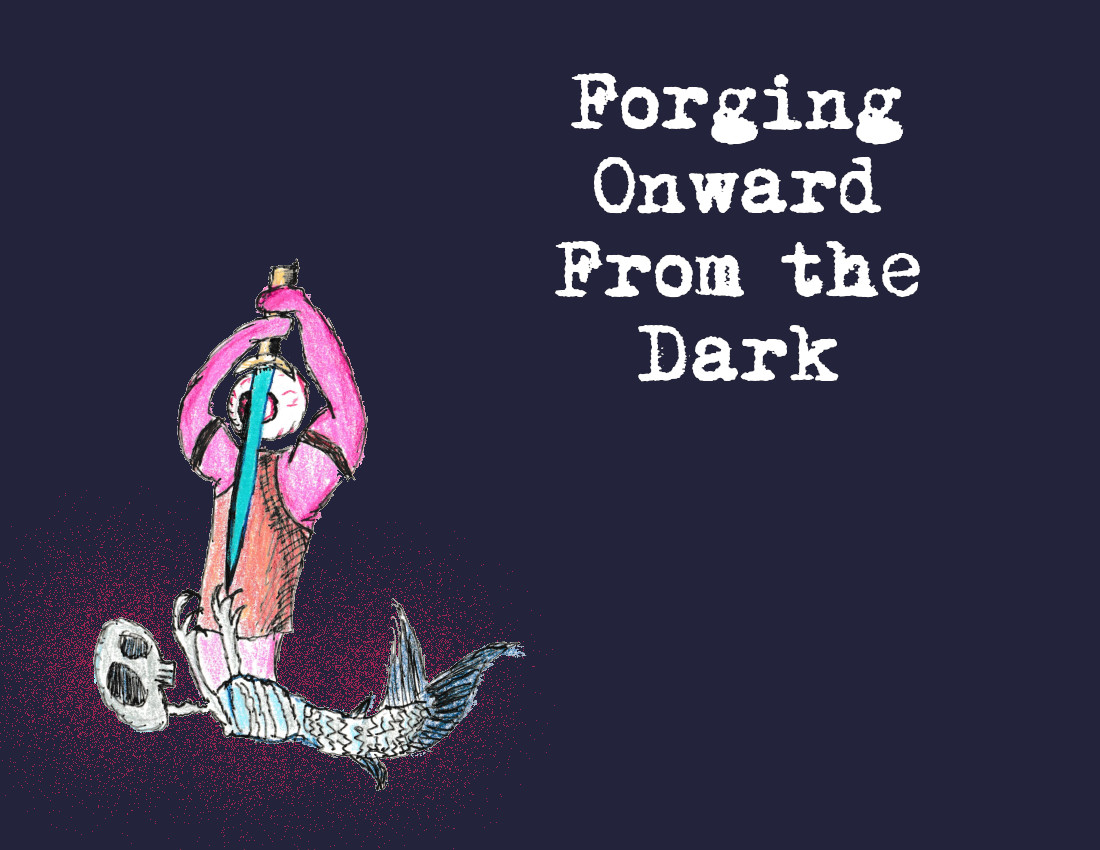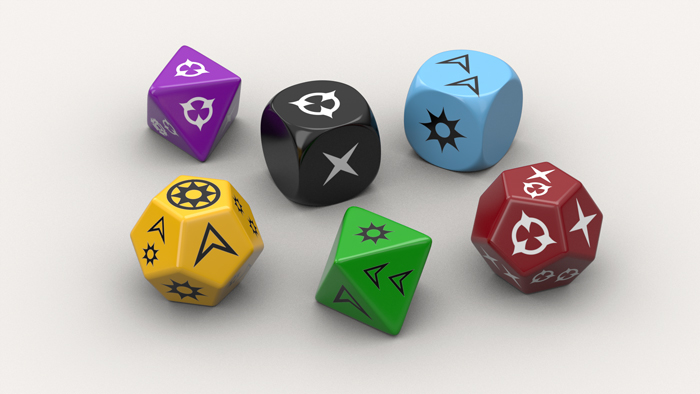Forging Onward From the Dark
Before we get into some lessons learned stuff, a quick admin update:
- The game is “done” the rulebook is not.
- My day job is asking a lot of me right now and rewrites/content updates are going to slow for the time being. I am still writing 1.3, but I am unlikely to hit the goal of an August release unless I can get real lucky with my schedule.
- The 1st full playtest campaign is wrapping next weekend.
- Extensive playtesting of the game will transition more into demo games instead. Of course I will still take rulebook and play feedback, but I won’t be repeatedly stress testing systems anymore.
- This blog has been a good way to help me unpack/process what I have made, and where I just kind of ramble about design. I plan to keep doing it every other Tuesday for now.
And now for today’s ramble:

I made Chronomutants to make a very fast, fun, chaotic, version of Gamma World that facilitated what I liked about those games the most: lite-hearted, violent, anything goes, sci-fi action with lots of player agency, and lots of weirdness.
The flavor I took from gamma world, to create core systems around were:
- Players are mutating weirdos.
- Unknown technology is extremely powerful, but dangerous to figure out.
- Monsters/obstacles can have large scope.
I also decided on goalposts to help me focus on my favorite parts of tabletop RPG:
- Unexpected results.
- Anything can be changed.
- Say yes to players/Players are storytellers.
- Nothing never happens/Fail forward.
I prototyped many many versions of a resolution mechanic that was flexible enough to handle any sci-fi nonsense and supported the session feel I wanted. I wanted players coming with crazy plans, to be the default play experience. I tried just hacking the hell out of various existing versions of gamma world, and I wanted something leaner, I wanted to cut away everything else, and do that one thing really well. I tried hacking other systems, Into the Odd, Savage Worlds, B/X, Genesys, Forged in the Dark, Apocalypse World.
Forged in the Dark ended up being the closest to the narration/crunch balance I wanted. The 2nd fully featured prototype used essentially the same core system with new playbooks/moves and it worked fine. Problem was that the position/effect system really rewards player cleverness and high tension situations. Perfect for a tense heist game, but I wanted to encourage the plans that were the best jokes, not the best plans. I couldn’t really come up with anything that was a better fit for a long while (actually there was about a year of fleshing out this version).
The flashback mechanic in Blades is a thing of beauty, and I found it very inspiring. I figured if I wanted to be as big and loud as possible I could throw time travel into my game instead of flashbacks. All the paradox, anomalies, and other weirdness that comes with time travel was both the ultimate player empowerment tool and switched on all of my goals at once:
- Players are mutating weirdos.
- Unknown technology is extremely powerful, but dangerous to figure out.
- Monsters/obstacles can have large scope.
- Unexpected results.
- Anything can be changed.
- Say yes to players/Players are storytellers.
- Nothing never happens/Fail forward.
All of these are explained/facilitated by time travel. The post apocalyptic world of Gamma World and a game of empowered players creating the most insane plans. It all just fit.
But Forged in the Dark no longer fit. I didn’t want to limit how much players could time travel. I didn’t want this to be a resource management game. I wanted the answer to always be yes. I have always had this anecdote a friend once told me about a looney tunes TTRPG “you could say I get a coke from the coke machine, so there was a coke machine” you could warp reality and create whatever the joke/story needed. I wanted that level of freedom. I didn’t need robust player handbooks or tracking time travel tokens or position/effect, I wanted a coke machine to be there because the players wanted it for a gag.
So I had all the random tables and flavor and items and mutations and skills and philosophy but no real solid resolution mechanic. Stayed that way for a long time, simmering on the back burner of my brain, waiting for that ah-ha moment where I would crack the case of the missing resolution mechanic. The answer came in two parts. First, a little game from Chris McDowell called Ask the Stars.
Ask the Stars is not so much a game, but a neat little rubric you can roll on and get prompts to your answers. It’s like a scrying spell you do with dice. As someone with a fascination for ritual magic and occultism and its intersection with therapeutic technique (DM me I got thoughts about Jung and tarot) I like this idea of a “you interpret the answer” kind of play. I once tried to combine a choose your own adventure story and I Ching into a thing. So a rubric of Yes and and No but combined with players having leeway to interpret what the dice meant.
The second half came from my research into the Genesys system. I bounced off this system as written pretty quickly. It’s a serviceable alternative to a DnD, but my heart belongs to Savage Worlds, which does that kind of pulp in a way that’s more appealing to me. It did remind me of Warhammer Fantasy which I played one (maybe twice) as a kid and I just could not wrap my brain around it. It was too different to 2e, which was the only RPG I knew besides Heroquest and other mostly board game RPG. I remembered one thing about my brief try with Warhammer Fantasy, and that was that skill rolls were often abstracted into one larger roll, as opposed to several consecutive checks. I remembered you rolled a bunch of dice at once. I got out my Genesys dice (same dice as Warhammer Fantasy, just new symbols) and tried to recreate that.

The color coded dice instead of the Rubric worked really really well. Sped up play, and created an avenue for player interpretation. I actually got a copy of Warhammer Fantasy, and was amused to discover that the version in my memory is not really how the game is played at all, but it’s okay, the thing I misremembered is better.
I really really didn’t want to use the Fantasy Flight proprietary dice, but I was not able to create anything with a similar set of diverse results that played as quickly and cleanly. The ease of use and simplicity won me over, at the cost of locking Chronomutants behind said proprietary dice. During design I decided I was going to make the best game I could, not a product, just the game I wanted for me and mine, but it's still a little sad that few people will ever play the game because of the weird dice needed to play.
That was the board strokes version of how I came up with the Narrative Dice Pool core mechanic. It’s a real neat resolution mechanic for story first roleplay, and is very flexible. More importantly it’s the mechanic that fits exactly how I wanted this game to play. It’s fast and has unexpected/complex results. You make your roll and then you tell the story. It’s a decidedly different take on RPG flow.
That’s it. You can find me here: https://bsky.app/profile/infantofatocha.bsky.social
Stay safe, destroy the timeline, f*ck it destroy everything,
-g
Get Chronomutants
Chronomutants
The game about time-traveling weirdos on a mission.
| Status | Released |
| Category | Physical game |
| Author | gary D. Pryor |
| Genre | Role Playing |
| Tags | gamma-world, gary-d-pryor, mutant, Post-apocalyptic, Sci-fi, storygame, Tabletop, Time Travel, Tabletop role-playing game |
| Languages | English |
More posts
- Update Version...Mar 19, 2025
- Version 1.3 is out!Nov 17, 2023
- Straying from the PathOct 18, 2023
- Saying YesOct 05, 2023
- Unleash the HorrorSep 13, 2023
- What's a Paradox War Anyway?Aug 08, 2023
- How (not) to Write a RulebookJul 25, 2023
- Employee of the Month: The Path to Excellence For the Freelance TimetravelerJul 11, 2023
- Mutation and You. A Guide.Jun 22, 2023

Leave a comment
Log in with itch.io to leave a comment.